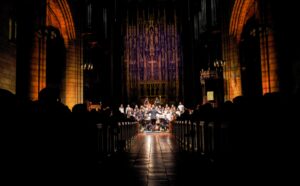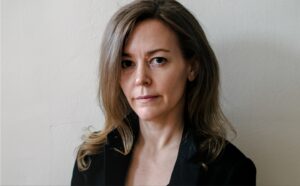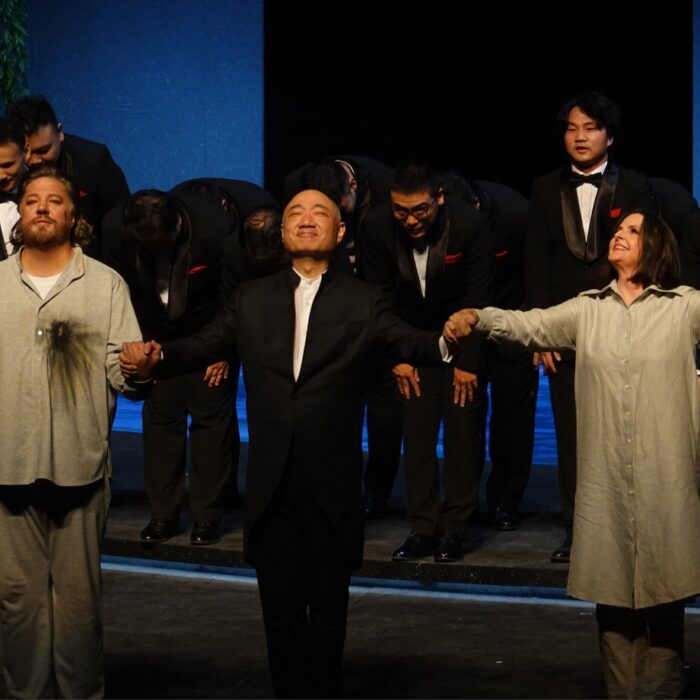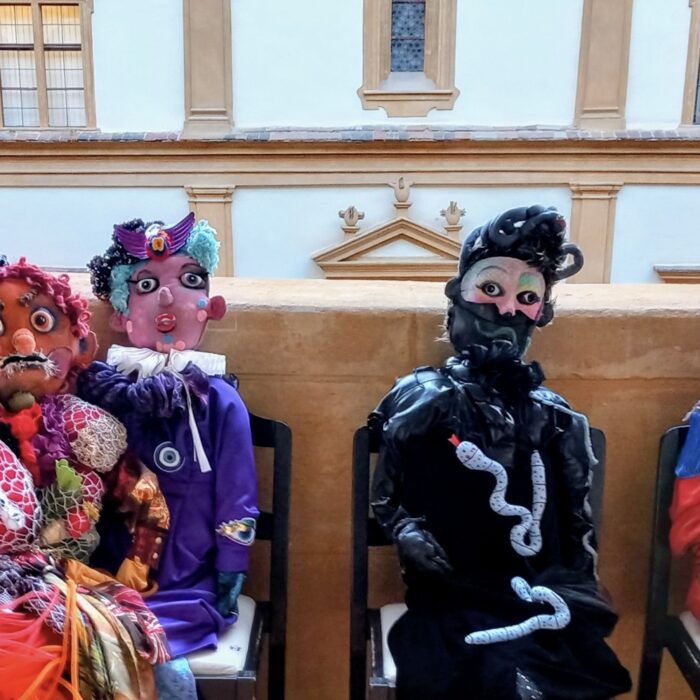
Death of Classical 2023 In Review: Waiting for the Barbarians
By Jennifer Pyron(Photo Credit: Kevin Condon)
Death of Classical (DOC) and The Alexander S. Onassis Benefit Foundation presented “Waiting for the Barbarians,” a one-night-only concert part of “Archive of Desire: A Festival Inspired by the Poet C.P. Cavafy” curated by prolific composer Paola Prestini and under the creative direction of Afroditi Panagiotakou. This extraordinary gathering took place on May 2nd, 2023 at the historic Saint Thomas Church Fifth Avenue and featured new works by Rufus Wainwright & Missy Mazzoli, Laurie Anderson, Helga Davis & Petros Klampanis, Nico Muhly, Paola Prestini, and more, in partnership with The Knights and the Brooklyn Youth Chorus.
Andrew Ousley, the founder of DOC, welcomed everyone and gave an enriching opening statement about Cavafy’s poems and how they continue to inspire today: “To me, all of the poetry of C.P. Cavafy contains some element of loss – a sense of what we must give up in order to exist in the world. That loss can be personal, such as when we offer a part of ourselves to someone else in the vulnerability of love and intimacy, or leave a piece of our history in the places where we make our home. It can also be political, when we subjugate ourselves to society and the common good, or sacrifice our individuality to the notion of ‘us vs. them’ (most poignantly in the titular poem “Waiting for the Barbarians,” in which an entire city has come to define itself solely in relation to its enemies).
But, what makes Cavafy’s poetry so profound is the fact that it doesn’t simply wallow in the negative space of what’s been taken away, but rather it also reminds us of all that we receive in that act of giving… the memories, the history, and the transcendent awareness that a shared experience of life can be greater than the sum of its parts. We are honored to share the staggering vision of these extraordinary artists, as they guide us through a kaleidoscopic exploration of what it means to lose ourselves, and what we discover in the process.”
A Stellar Night of New Works
“Chandelier (I Went),” composed by Rufus Wainwright and arranged by American composer Missy Mazzoli, was the first piece of the night’s list of incredible debuts of original works.
“Chandelier (I Went),” was performed by Wainwright and The Knights, and conducted by Eric Jacobsen. Wainwright, is a Canadian-American singer, songwriter and composer. During this performance, he sang with a gentle timbre. His voice was reserved at the start, however, throughout the journey of this piece it blossomed into a very intimate reveal. His stage presence was magical. Wainwright was enthralled with the luscious text and his voice emoted many feelings.
Missy Mazzoli arranged “Chandelier (I Went)” and I enjoyed Mazzoli’s musical voice throughout this piece. It was like a mix of familiarity discovered by a sometimes eerie or strange motif that pushed the envelope of different lyrical ideas. Her works are known to be inspired by the humans she works with, and so “Chandelier (I Went)” felt like a genuine collaboration between her and Rufus Wainwright. There was a comforting tempo and gentle nostalgia that it provoked. A chandelier somewhere was surely floating. All I had to do was look up into the gothic interior of Saint Thomas Church to see one above me enjoying the night too.
“Chandelier (I Went)” was inspired by the poem “Chandelier,” by C. P. Cavafy:
In a room—empty, small, four walls only,
covered with green cloth—
a beautiful chandelier burns, all fire;
and in each of its flames a sensual fever,
a lascivious urge, glows with heat.
In the small room, radiantly lit
by the chandelier’s hot fire,
no ordinary light breaks out.
Not for timid bodies
the rapture of this heat.
The Gifts of a Ghost
“Cavafy Ghost,” composed by Helga Davis & Petros Klampanis, was performed next and featured Davis and Klampanis alongside The Knights and the incredibly talented Brooklyn Youth Chorus. The start of this piece was delicate, as harpist Kristi Shade was created sweeping arpeggios that invited listeners to relax and enjoy. The music became an opening that led into something more, especially when Petros Klampanis began playing bass. A story was developing and just as percussionist Ian Sullivan gracefully played, the Brooklyn Youth Chorus whispered and mouthed text into the atmosphere. A young voice, Josie Shehadi, sang a solo from within the chorus and Helga Davis masterfully conducted the ethereal developments.
The chorus continued to sing a dissonant mix that created a bed of sound for Josie Shehadi’s voice to indulge in and illuminated the purity of Shehadi’s voice as the brilliant ghost among us. The Knights continued to play minimally in accompaniment with the singers’ voices as they swelled and stretched inside the gothic arches. A distant siren could be heard from outside the church and all became one unified effort to awaken a range of mysteriousness. Helga Davis slowly walked back behind the chorus to join Klampanis who played near the podium. Her voice soared into the heavens as she made her way, like a rich stream of pure gold with Klampanis’ voice softly vocalizing in the background. Davis is known for bringing together audiences in powerful ways of performance, and most especially the powerful ways of her own voice. I noticeably saw audience members sit upright when she began to sing. Clearly, Davis’ voice evoked a supernatural response.
“The Return” and “Far Away Songs” debuted next and featured the voice of soprano Eleni Calenos. Composed and arranged by Dimitris Papadimitriou & Nathan Thatcher, “The Return” was a body of strings that played heartwrenching ostinatos only to be amplified in their emotionality by Calenos’ voice. She bared her soul as she sang and melted into the waves of accompanying passionate music. I was transported elsewhere and at the same time so very happy to be where I was in the audience, as a witness to this moment.
“Far Away Songs,” composed by Nico Muhly and arranged by Nathan Thatcher, dove into the depths of loss and resonated with internalized voices surrounding this theme. Calenos sang the text, “those voices” repeatedly at the start, with each one becoming more ardent than the one before. This piece delivered a stirring response that felt different from the others, for me. The Knights played Muhly’s composition with flair and excitement. A brand new palette of colorful sounds painted the insides of Saint Thomas Church’s darkened hall. I felt the range of exploration around “loss” becoming this magnificent web that held listeners together. I reflected on the universality of music during this piece. The vastness that wants to be curiously touched when listening and opening to something greater. “Far Away Songs” made me feel like I was in the presence of a most dear and beloved friend.
Transcending Voices
“Voices,” composed by Paola Prestini and performed by Brooklyn Youth Chorus, under the direction of Dianne Berkun Menaker, featured a heavenly chorus of young singers reminiscent of angels ascending among us. Together, they alternated raising one of their arms and pointing up above while singing. Prestini’s “Voices” was a joyful and playful sound world that reflected on unification through the human voice. This higher level of awareness that she understands wholeheartedly and empowers others, especially young voices, to share with the world.
For me, “Voices” was a musical conversation that investigated Cavafy’s theme about loss and proved the act of giving up, for the betterment of the whole, to be the most empowering act of all. Observing the young singers then quietly holding their hands in front of their own mouths as they continued to sing reminded me of the veils we sometimes put in place of our own voices. The limitations, boundaries, and separateness that oftentime get in the way of living and actively coming together in constructive ways to make positive changes.
“Voices” was inspired by the poem “Voices,” by C.P. Cavafy:
Voices, loved and idealized,
of those who have died, or of those
lost for us like the dead.
Sometimes they speak to us in dreams;
sometimes deep in thought the mind hears them.
And with their sound for a moment return
sounds from our life’s first poetry—
like music at night, distant, fading away.
Waiting for the Barbarians
“Waiting for the Barbarians/Ithaka,” composed by Laurie Anderson, arranged by Jacob Garchik, and performed by Laurie Anderson, The Knights, and Brooklyn Youth Chorus, and conducted by Eric Jacobsen, was the final performance of this once-in-a-lifetime gathering. Laurie Anderson read C.P. Cavafy’s thought-provoking poems and with her undeniably intelligent wit, she bit and chewed on the ideas of the “barbarians coming.” An electronic music backtrack played and the chorus repeated the phrase “the barbarians are coming.” I could visibly see and hear surrounding audience members enjoying this piece and actively imagining a moment in time when a city was built around the idea of being against “barbarians coming.”
There was a turning point midway through this piece, when the tempo slowed down and Laurie Anderson’s voice elongated the text in a slowed dissipation of sour understanding. Was it worth it to build a city in fear of its own potential enemies? Where did the city’s value then come from? Hate and resistance amounted to the ultimate powerlessness in this scenario and so when the music shifted into an introspective and relaxing tone, I felt like we were all meditating on where we stand as a country, and let’s expand this idea about where we stand as a world. I thought about how “waiting for the barbarians” was this radical solution to a disease that festered within the hearts of many. This “waiting around” and not wanting to “lose.”
Laurie Anderson played her violin and the electronic processing resonated tones into the hall that could only be felt and equally processed at a higher level of awareness. For we were transcended together and would be leaving this gathering in a better place than when we first arrived. “Waiting for the Barbarians/Ithaka” was a spectacular phenomena.
The Poems
“Waiting for the Barbarians” by C.P. Cavafy:
What are we waiting for, assembled in the forum?
The barbarians are due here today.
Why isn’t anything happening in the senate?
Why do the senators sit there without legislating?
Because the barbarians are coming today.
What laws can the senators make now?
Once the barbarians are here, they’ll do the legislating.
Why did our emperor get up so early,
and why is he sitting at the city’s main gate
on his throne, in state, wearing the crown?
Because the barbarians are coming today
and the emperor is waiting to receive their leader.
He has even prepared a scroll to give him,
replete with titles, with imposing names.
Why have our two consuls and praetors come out today
wearing their embroidered, their scarlet togas?
Why have they put on bracelets with so many amethysts,
and rings sparkling with magnificent emeralds?
Why are they carrying elegant canes
beautifully worked in silver and gold?
Because the barbarians are coming today
and things like that dazzle the barbarians.
Why don’t our distinguished orators come forward as usual
to make their speeches, say what they have to say?
Because the barbarians are coming today
and they’re bored by rhetoric and public speaking.
Why this sudden restlessness, this confusion?
(How serious people’s faces have become.)
Why are the streets and squares emptying so rapidly,
everyone going home so lost in thought?
Because night has fallen and the barbarians have not come.
And some who have just returned from the border say
there are no barbarians any longer.
And now, what’s going to happen to us without barbarians?
They were, those people, a kind of solution.
“Ithaka” by C.P. Cavafy:
As you set out for Ithaka
hope the voyage is a long one,
full of adventure, full of discovery.
Laistrygonians and Cyclops,
angry Poseidon—don’t be afraid of them:
you’ll never find things like that on your way
as long as you keep your thoughts raised high,
as long as a rare excitement
stirs your spirit and your body.
Laistrygonians and Cyclops,
wild Poseidon—you won’t encounter them
unless you bring them along inside your soul,
unless your soul sets them up in front of you.
Hope the voyage is a long one.
May there be many a summer morning when,
with what pleasure, what joy,
you come into harbors seen for the first time;
may you stop at Phoenician trading stations
to buy fine things,
mother of pearl and coral, amber and ebony,
sensual perfume of every kind—
as many sensual perfumes as you can;
and may you visit many Egyptian cities
to gather stores of knowledge from their scholars.
Keep Ithaka always in your mind.
Arriving there is what you are destined for.
But do not hurry the journey at all.
Better if it lasts for years,
so you are old by the time you reach the island,
wealthy with all you have gained on the way,
not expecting Ithaka to make you rich.
Ithaka gave you the marvelous journey.
Without her you would not have set out.
She has nothing left to give you now.
And if you find her poor, Ithaka won’t have fooled you.
Wise as you will have become, so full of experience,
you will have understood by then what these Ithakas mean.



